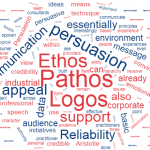
One of the most common issues observed in the field of Reliability encountered by numerous practitioners is how to convince people around them commit to and support their initiatives. This barrier is not only a hindrance to seek the executive support within their organizations but also at other levels across the hierarchy. Similarly, many consultants and service providers also fail to essentially convey their message in a persuasive and effective manner.
Persuasion is both an art form and a science. At one hand, each and every interaction we have in our lives whether personal, professional, legal, spiritual or otherwise is unique and has its own contexts and complexities; some of the basic rules to prepare our personalities to be persuasive enough to convince others to our ideas remain same.
While technology has essentially changed the ways we communicate, some of the basic fundamentals of communication and persuasion still remain the same.
The great Greek philosopher Aristotle outlined three basic principles of persuasion.
- Ethos – ethical appeal – persuasion through the credibility of the communicator’s character.
- Pathos – emotional appeal – persuasion through appeal to receiver’s emotional or experience based connection to the subject.
- Logos – logical appeal – convincing through logic and reasoning.
Persuasion is clearly a sort of demonstration, since we are most fully persuaded when we consider a thing to have been demonstrated. Of the modes of persuasion furnished by the spoken word there are three kinds. … Persuasion is achieved by the speaker’s personal character when the speech is so spoken as to make us think him credible. … Secondly, persuasion may come through the hearers, when the speech stirs their emotions. … Thirdly, persuasion is effected through the speech itself when we have proved a truth or an apparent truth by means of the persuasive arguments suitable to the case in question. — Aristotle, Rhetoric, 350 BC

In an industrial or corporate environment each Reliability practitioner needs to inculcate the above principles within their communication to ensure that their message is effective.
When Aristotle talks about Ethos, he essentially says that before you even start your communication, your reputation should already be established with the receiver as an authority or a credible source on the subject. From an industrial or corporate point of view this is mainly in form of your track record, achievements, experience or education.
E.g. any consultants or service providers who are already known to have brought immense value to their clients through their work are already seen as credible and thus appeal to their audience as someone worth listening to. If as an in-house Reliability practitioner you want to convince your organization on your ideas, you first need to establish your credibility through your work. People across all levels of the hierarchy will only listen to you if they trust you as a professional in your field.
Ethos can also be impressed through association to an entity or personality already seen as an authority in its domain of expertise. This can be a professional association, commercial entity or a person.
The emotional appeal or Pathos may sound a bit difficult to be conceived as an integral part of our communication within an industrial or corporate environment. It may seem more relevant to the consumer arena as we use to associate it more with the consumer marketing. However, we always stumble upon it and use it without even realizing.
Pathos in our context is more related to the ‘experiences’ of our audience. Interestingly, Pathos literally means evoking the feeling of sadness in the receiver. So, when you talk about the pain points or the negative experiences of your audience about a certain asset or system you’re essentially employing Pathos to communicate. This requires your message to be focussed, well directed and customized.
Developing and talking about ‘Use Case Scenarios’ that address specific issues affecting the audience is a good technique that uses the principle of Pathos.
Most of the decisions made in an industrial or corporate environment are influenced through the rational or logical thinking pattern of people. Hence, Logos plays a significant role in how the communication is done in such an environment. Interestingly, this was Aristotle’s favourite technique of persuasion. Logos is inherently evidence based. In today’s world of data, this technique becomes more useful to support our arguments.
The facts and figures that are used to support a particular argument or a message are essentially what Logos means. Reliability practitioners should use data to support their initiatives as it is irrefutable and can be compelling evidence for their claims. However, caution should be taken to see the data from a myopic point of view. Sometimes, how we see data corrupts our view of it when in reality it could be pointing in other direction. An open-minded review of data from all opposing angles should be done prior to using it to support an argument.
In retrospect, Logos also enhances the Ethos as it also brings in an element of credibility to the communicator.
Remember, any communication involving humans despite their topic of discussion have some social and psychological dimensions to them. Adopting this philosophical approach allows us to also engage these dimensions of relationships.
If we as a Reliability fraternity consciously apply these basic techniques of persuasion and appeal to our communication we can definitely go a long way in gaining support for our ideas and initiatives.
 Ask a question or send along a comment.
Please login to view and use the contact form.
Ask a question or send along a comment.
Please login to view and use the contact form.
Leave a Reply